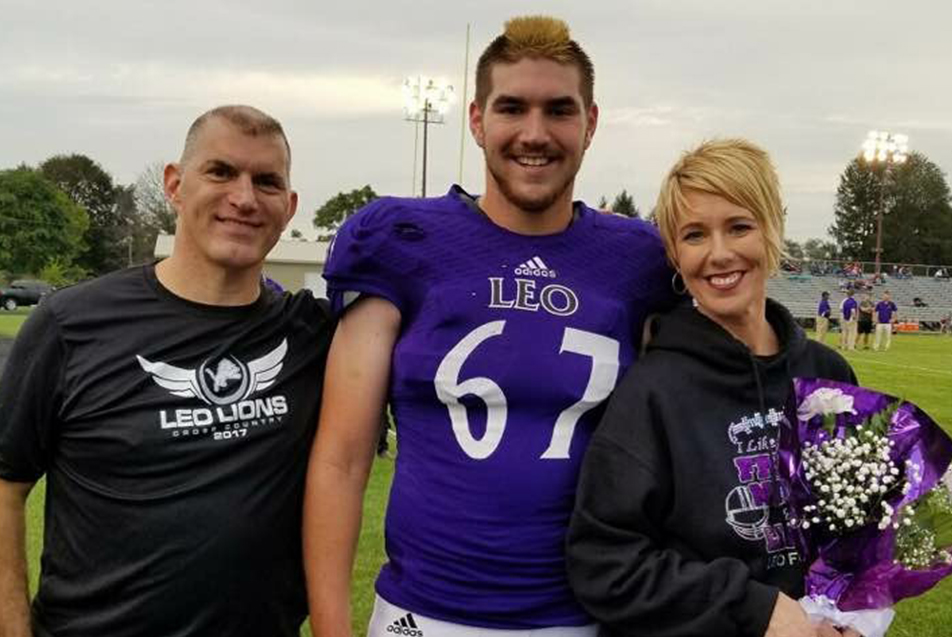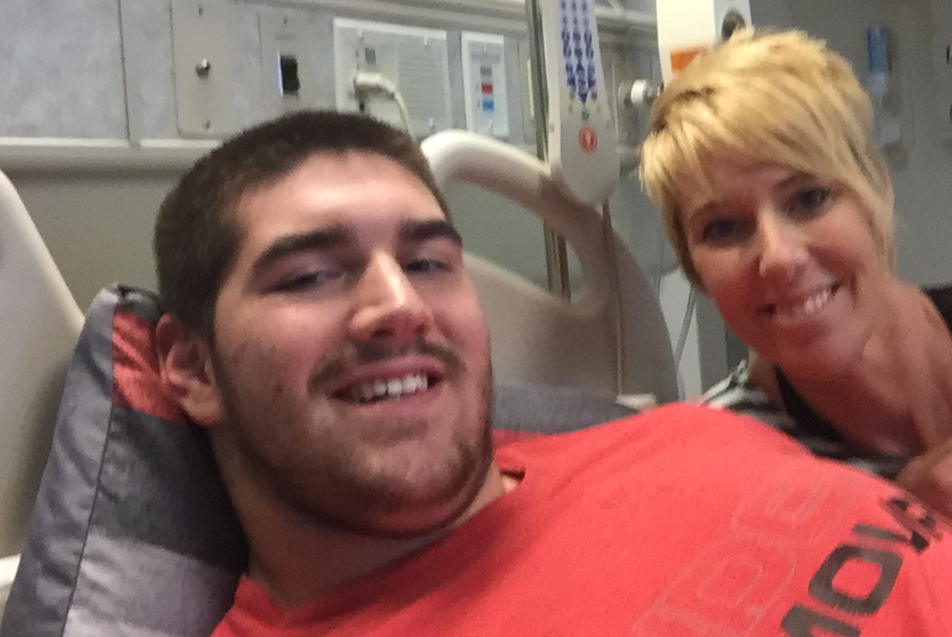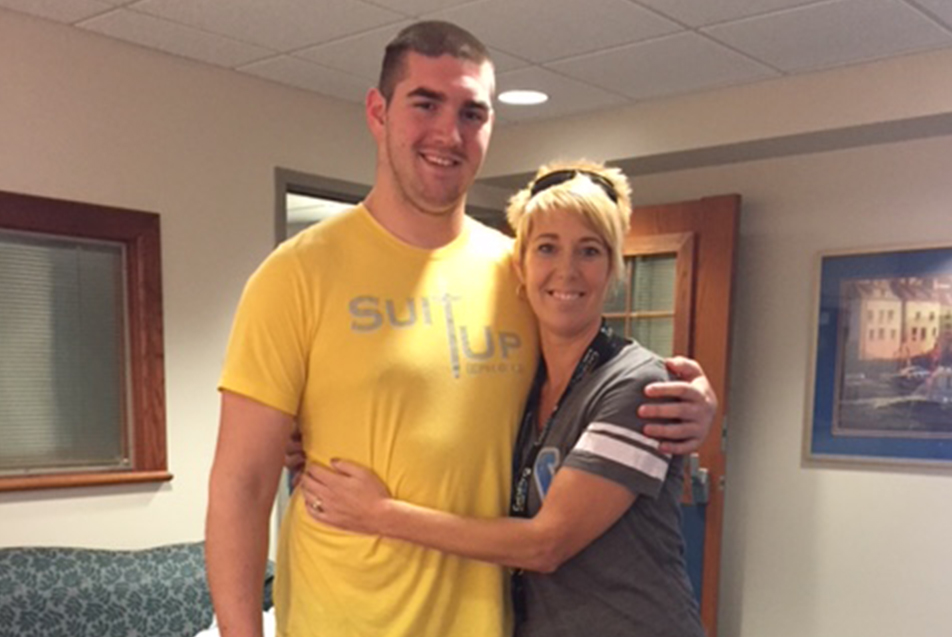
Most of us think of stroke as a risk for older adults, but as Beth Berghoff and her son, Isaak, share, that’s not always the case. The pair recall the journey their family went through after Isaak suffered a stroke at just 18 years old, and Amber Hetrick, MD, PPG – Neurology, provides more about the science of stroke.
What was Isaak’s health like prior to the stroke?
Beth: Isaak was a very active and healthy 18-year-old. He had no real indicators that something was amiss with his health.
Isaak: I thought I was good and healthy.
Can you share what you remember about the day of the stroke?
Beth: Isaak called me on his way home from his job that afternoon and said he felt like he was dehydrated. He told me he just didn’t feel that well and wasn’t sure if he was going to go to a church function that evening, which was very unusual. I advised him to go home and rest and hydrate and I would check in with him when I got home from work.
When I got home, which was about 1 1/2 hours after I had initially spoken to Isaak, I found him lying on his bed staring off into space. He wasn’t able to coherently answer my questions, and I knew something was wrong. He was able to make it out to my van and I drove him to the ER.
Isaak: I remember I went to work and I was able to come home. I took a shower and then my head started to hurt really bad. I remember my mom coming home and then I was in her van and then at the hospital, throwing up. After that I don’t remember a lot. Little pieces come back every once in a while and I have to ask my mom if it really happened like I think it did.

What do you remember about recovery?
Isaak: I don’t remember a lot until about 2-3 weeks after the stroke. I remember having to make myself move my left leg and arm a lot because they didn’t want to move on their own. I remember the therapists working with me and me trying to give them a hard time sometimes. Some days I was just so tired, and my head would hurt a lot and I didn’t want to do anything.
What were your thoughts after hearing the diagnosis?
Beth: I initially thought, “Why did I have to be right?” And then my husband, Tim, and I cried a lot. But God gave me the peace that I needed and brought my friends in to support us just at that moment. I am not one to sit still, so I wanted to know what was next and how do we help him recover.
Isaak: I was scared when I found out about the stroke. But then God told me it was going to be OK and not to worry. It was really a calming thing, but strange at the same time. I remember telling my mom that it would be OK because God told me it would.

What has his recovery been like?
Beth: It has been challenging to say the least. We have four children and we both work full time, so to suddenly stop time to focus on one child was difficult since I don’t want to miss anything with any of my kiddos. But God had things already worked out and I had family and friends jump right in and take over where I needed help. My other children were loved on in ways that are still beyond my understanding. Working for Sweetwater was just one more blessing, as they allowed me (and still continue to allow me) to take the time needed to be with my family. I was able to devote all of my time to helping Isaak recover.
Parkview In-Patient Rehab is beyond amazing. The staff took us in with open arms and offered encouragement and support at every turn. Dr. Leuthner and his nurse Jennifer made sure Isaak was well taken care of. The therapists and nursing staff went above and beyond in helping Isaak recover. They definitely feel like part of our family now. Outpatient Rehab has been just as much of a blessing to us! His recovery wouldn’t be what it is without everyone loving on Isaak the way they have.
How is Isaak doing today?
Beth: Looking at Isaak now, you would have no idea he had a stroke. He has made huge strides in his physical rehab. His biggest challenge is cognitive, with word recall seeming to be at the top. But he is making improvements daily and is determined to regain what is missing. He is still a go getter, and when he has his mind set to do something, he is going to do it. He just needs to take more breaks in his day and have moments of downtime that he didn’t need before. He is still ornery and likes to make us laugh.
Isaak: I’ve been doing great and, by the grace of God, I have been able to regain my ability to speak fluently.
What would you tell others about the risk of stroke?
Beth: We didn’t really recognize that Isaak had any risk for a stroke. We still aren’t sure why he had the stroke, and we may never get the answer. What I would say is to never rule out the symptoms of a stroke or chalk it up to nothing, because, like in our case, it definitely was something.
Isaak: A stroke can happen to anyone at any age, and it’s good to check your blood pressure periodically.
A physician weighs in
According to Dr. Hetrick, you can think of a stroke as a heart attack to the brain. Often, an occurrence can be attributed to some underlying problems, such as a genetic blood condition or a heart condition. Other common causes include:
- drug usage
- smoking
- diabetes
- high blood pressure
- cholesterol levels
While it’s less likely that a stroke will occur in a younger individual, it can happen. In fact, there is a possibility of stroke from conception (a baby in utero) all the way up through life. It’s one of the most common health issues worldwide. Stroke can happen in younger adults as well, especially those who are smoking or those who are doing street drugs, such as cocaine.
Reducing risk of stroke
Diet is huge. The best diet for stroke prevention is currently believed to be the Mediterranean diet. It’s a diet that is high in fruits and vegetables, complex grains (brown rice), complex carbohydrates, whole grains and breads, fish and white protein (low red meat). As a rule, try to consume everything in moderation.
It’s also incredibly important to make sure that your high blood pressure, diabetes and cholesterol are controlled. Those are huge risk factors for stroke.